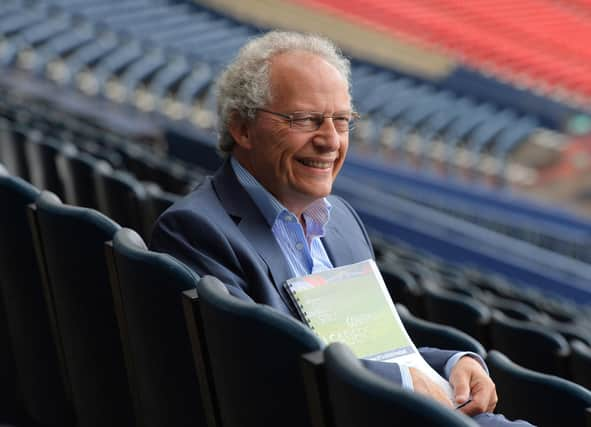Part II of Football Special: Former Scottish First Minister Henry McLeish’s love for ex-club East Fife


What a privilege it was to see and handle the medal he had won and on that night when they arrived back in Methil with the Cup to an ecstatic welcome. My grandparents were there, cheering and soaking up what must have been and incredible atmosphere. My legacy from that night was two very thin tumblers with the result and team name inscribed on them, passed down to me by my grandparents.
I often reflect on the significance of Hampden Park in my football life.
Advertisement
Hide AdAdvertisement
Hide AdMy first visit to our national stadium was in 1955 when I was seven years of age. It was with my grandfather to see Billy Graham, the famous American Evangelist. I have few recollections of the religiosity of the occasion but remember vividly the awesome size of the stadium and the atmosphere of the crowd. In my early years, religion and football had many encounters- including having to hide my boots when leaving his house on a Sunday, his sacred day, to play down the park- it was always strange to think that my grandfather and I eventually played in the same position, 57 years apart.
My second visit to Hampden was when I was 12 to watch the Real Madrid vs Eintracht Frankfurt European Cup final when Real won 7-3. Recognised as the greatest game the world as ever seen, that was a night to Remember. The game was watched by 129,000 people and what was remarkable was the fact that Eintracht had beaten Glasgow Rangers 12-4 on aggregate in the semi-final: and at that time Rangers were a great side! A great footballing city and country had provided a special place for this kind of thing to happen.
My third visit was my first professional game for East Fife in 1964.
On a lighter note I remember the night East Fife were literally on fire. Mid- season the club were away to Stranraer, with an overnight stay in Girvan, Ayrshire. At midnight, a fire started, and all the players had to escape. It was dangerous and serious. The next morning came and the game had to go on. However, in order to get there, the Chairman of the club, Big Jock Fleming, had to take most of the players to Marks and Spencer to buy them sweaters and trousers as their clothes had been burnt in the fire! On that dark and dreich day, we lost the match in Stranraer, but certainly returned home with a story to tell.
Advertisement
Hide AdAdvertisement
Hide AdThe early history of the game brought out the best in working people: that sense of local identity and place, a generation of local heroes and a focus for their pride and passion which established so much incredible loyalties that we still see today in every part of Scotland, including Methil.
Being part of this even in a very modest way, is a privilege. Some of these communities experienced mining disasters, including Methil and it is easy to see why class and solidarity became so important in shaping lives and clubs. Many local communities and their clubs have experienced enormous changes in the last century and that is why we must respect their achievements. Football was a way of life and for many it remains so.
Football’s role in the history of Scotland should never be overlooked or undervalued, but always seen as a reminder of what was and still could be. Looking ahead it is our legacy and we must build on it.
For East Fife and many other clubs in Scotland we live in significantly different times and the social, economic, and financial landscape has changed out of all recognition. But the values that lie behind clubs like East Fife have endured through time and will continue to do so. For many clubs, their best days may be behind them, but their legacies, inspiration and achievements live on. Clubs like East Fife stand for more than football.
Advertisement
Hide AdAdvertisement
Hide AdReminding ourselves where we have come from is a good place to start in shaping a different future. I did not scale the heights of the game as a player, far from it, but nevertheless my involvement taught me many things about what matters in life and how the social, personal and political aspects of belonging and the ideals of solidarity and community remain beacons of inspiration and encouragement in difficult times.
It was no surprise that when I left Buckhaven High School in 1963 I received a report card that summed up my life to that point and became a wake- up call for me to change my mind set. In summary the school Rector’s parting comment was, “I am glad the boy can play football, because he has no future in education”. Hardly a ringing endorsement or a boost to my confidence, but my early life in the beautiful game did help me shape a life of public service, and respect for the idea of community. Imagine what was going through his mind when I returned to school after my time with Leeds!
The memories of Methil-born McLeish, 75, an author, academic and former professional footballer who served as First Minister of Scotland from 2000 to 2001, appear within the newly published book Back o’ the Net!: Why We Love Scottish Football, compiled and edited by Paul Goodwin and Donald C Stewart.
Comment Guidelines
National World encourages reader discussion on our stories. User feedback, insights and back-and-forth exchanges add a rich layer of context to reporting. Please review our Community Guidelines before commenting.